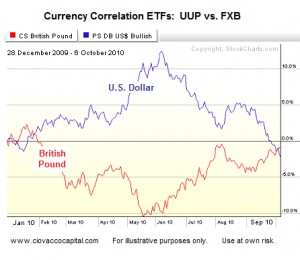Printing Money: The process of "printing" money is always a kind of mystery to most people since only about 10% of the total money supply is actually in physical currency. Technically most of the money isn't printed so the term should be "money creation" or "money supply expansion" but "printing money" is used euphemistically to include all forms of expanding the money supply. The monetary base (or money supply) is typically controlled by adjusting monetary policy. This is usually done by the central bank (in the U.S. this is the Federal Reserve Bank or FED). The FED changes the monetary base through "open market transactions" (i.e., buying and selling of government bonds). The FED also … [Read more...]
Pressures Mount on Bank of England (BOE) to Devalue Pound
October 7, 2010 By Chris Ciovacco The Bank of England (BOE) is due to make a statement today at noon in London (7:00 a.m. ET U.S.). The BOE’s actions in the next 45 days may be important to investors in the U.S. and global commodity markets. All things being equal, a weak U.S. dollar tends to provide favorable headwinds to both U.S. stocks and commodities, such as oil (USL), copper (JJC), gold (GLD), and silver (SLV). With the BOE facing more bad news on the housing front today, political pressures to join the money-printing parties in the United States and Japan are mounting. As shown below, the U.S. Dollar (UUP) and British Pound (FXB) tend to be negatively correlated. Should the … [Read more...]


